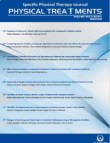The Effect of Transcranial Direct Current Stimulation and Core Stability Training on the Balance and Disability of Patients With Multiple Sclerosis
Physicians report balance disorders and fatigue as the symptoms of Multiple Sclerosis (MS) disease. The present study compares the effect of transcranial Direct Current Stimulation (tDCS) and core stability training on the balance and disability of patients with MS.
This is a pre-test, post-test experiment study. The statistical population included all patients with MS who reffered to Rofaydeh Rehabilitation Hospital in Tehran City, Iran, in the winter of 2019. A total of 30 male and female patients aged 27-70 years were selected through available and purposive sampling methods and then randomly divided into experimental and control groups (each group 15 persons). The initial measurements of the participants’ kinetic variables of postural control were carried out by the posturography device, and afterward, Kurtzke Expanded Disability Status Scale (EDSS) was employed to measure disability. The participants’ training included core stability training for 8 weeks (30-40 min, 3 sessions per week) with 20 min online cerebellar transcranial direct current stimulation, 2 sessions per week (The first and third sessions). Then, the research variables were measured again.
The results demonstrated the significant influence of cerebellar tDCS on the variables of postural control equilibrium in the second sensory condition (P<0.001), third sensory condition (P<0.001), fourth sensory condition (P<0.001), fifth sensory condition (P=0.034), and combine equilibrium (P<0.001). Besides, the cerebellar current stimulation enhanced the sensory performance of the experimental group in using the vestibular system input data (P<0.001) and vision (P<0.001), but it had no significant effect on the ability to use somatosensory input (P=0.203) and vision preference (P=0.343). This research also revealed that the cerebellar current stimulation decreased EDSS in MS patients (P=0.026).
The cerebellar tDCS has a beneficial effect on balance, EDSS, and modified fatigue impact scale in MS patients. The study findings also indicate that the cerebellum, vestibular system, and visual system are related, and they have an impact on balance, and cerebellar stimulation can facilitate learning motor skills.
- حق عضویت دریافتی صرف حمایت از نشریات عضو و نگهداری، تکمیل و توسعه مگیران میشود.
- پرداخت حق اشتراک و دانلود مقالات اجازه بازنشر آن در سایر رسانههای چاپی و دیجیتال را به کاربر نمیدهد.



